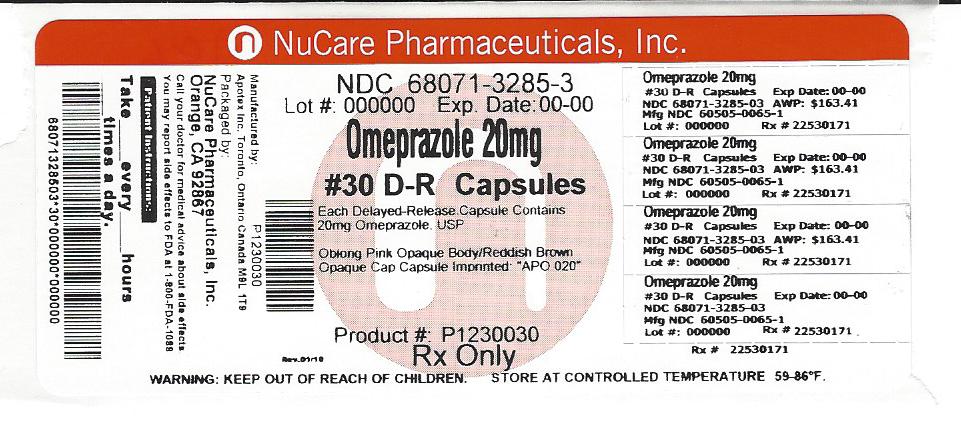Modern medicine has evolved so much so that sooner or later every breastfeeding mother needs to take it in one form or other. Medication that is present in mothers blood will transfer into her breast milk to some extent. Most drugs do so at low levels and pose no real risk to infants but then there are some exceptions. In This post will discuss whether Omeprazole Capsule, Delayed Release is safe in breast-feeding or not.
What is Omeprazole Capsule, Delayed Release used for?
Omeprazole is a proton pump inhibitor (PPI) indicated for the: Treatment of active duodenal ulcer in adults ( 1.1) Eradication of Helicobacter pylori to reduce the risk of duodenal ulcer recurrence in adults ( 1.2) Treatment of active benign gastric ulcer in adults ( 1.3) Treatment of symptomatic gastroesophageal reflux disease (GERD) in patients 1 year of age and older ( 1.4) Treatment of erosive esophagitis (EE) due to acid-mediated GERD in patients 1 month of age and older ( 1.5) Maintenance of healing of EE due to acid-mediated GERD in patients 1 year of age and older ( 1.6) Pathologic hypersecretory conditions in adults ( 1.7) 1.1 Treatment of Active Duodenal Ulcer Omeprazole delayed-release capsules are indicated for short-term treatment of active duodenal ulcer in adults. Most patients heal within four weeks. Some patients may require an additional four weeks of therapy. 1.2 Helicobacter pylori Eradication to Reduce the Risk of Duodenal Ulcer Recurrence Eradication of H. pylori has been shown to reduce the risk of duodenal ulcer recurrence. Triple Therapy Omeprazole delayed-release capsules in combination with clarithromycin and amoxicillin, are indicated for treatment of patients with H. pylori infection and duodenal ulcer disease (active or up to 1-year history) to eradicate H. pylori in adults. Dual Therapy Omeprazole delayed-release capsules in combination with clarithromycin are indicated for treatment of patients with H. pylori infection and duodenal ulcer disease to eradicate H. pylori in adults. Among patients who fail therapy, omeprazole delayed-release capsules with clarithromycin are more likely to be associated with the development of clarithromycin resistance as compared with triple therapy. In patients who fail therapy, susceptibility testing should be done. If resistance to clarithromycin is demonstrated or susceptibility testing is not possible, alternative antimicrobial therapy should be instituted [see Clinical Pharmacology ( 12.4) and the clarithromycin prescribing information, Microbiology section ]. 1.3 Treatment of Active Benign Gastric Ulcer Omeprazole delayed-release capsules are indicated for short-term treatment (4 to 8 weeks) of active benign gastric ulcer in adults. 1.4 Treatment of Symptomatic Gastroesophageal Reflux Disease (GERD) Omeprazole delayed-release capsules are indicated for the treatment of heartburn and other symptoms associated with GERD for up to 4 weeks in patients 1 year of age and older. 1.5 Treatment of Erosive Esophagitis (EE) Due to Acid-Mediated GERD Pediatric Patients 1 Year of Age to Adults Omeprazole delayed-release capsules are indicated for the short-term treatment (4 to 8 weeks) of EE due to acid-mediated GERD that has been diagnosed by endoscopy in patients 1 year of age and older. The efficacy of omeprazole delayed-release capsules used for longer than 8 weeks in patients with EE has not been established. If a patient does not respond to 8 weeks of treatment, an additional 4 weeks of treatment may be given. If there is recurrence of EE or GERD symptoms (e.g., heartburn), additional 4 to 8 week courses of omeprazole may be considered. Pediatric Patients 1 Month to Less than 1 Year of Age Omeprazole is indicated for the short-term treatment (up to 6 weeks) of EE due to acid-mediated GERD in pediatric patients 1 month to less than 1 year of age. 1.6 Maintenance of Healing of EE Due to Acid-Mediated GERD Omeprazole delayed-release capsules are indicated for the maintenance healing of EE due to acid-mediated GERD in patients 1 year of age and older. Controlled studies do not extend beyond 12 months. 1.7 Pathological Hypersecretory Conditions Omeprazole delayed-release capsules are indicated for the long-term treatment of pathological hypersecretory conditions (e.g., Zollinger-Ellison syndrome, multiple endocrine adenomas and systemic mastocytosis) in adults.
Omeprazole Capsule, Delayed Release while breastfeeding safe or not? Can there be any side effects for infant while using it during breastfeeding?
As per our analysis Omeprazole Capsule, Delayed Release contains only one ingredient and that is Omeprazole. We have analyzed Omeprazole and it seems to be safe to use Omeprazole while breastfeeding, that means usage of Omeprazole Capsule, Delayed Release shall be safe while breastfeeding. Below you can check more details of Omeprazole usage in breastfeeding. We recommend you to go through provided detailed analysis as below take decision accordingly.
Omeprazole Capsule, Delayed Release Breastfeeding Analsys
SafeCAS Number: 73590-58-6
High plasma protein binding makes excretion into breast milk to be insignificant. No side effects were observed in breastfed infants of treated mothers. Shown to be labile in acid-pH environment must be administered in the form of micro-granules within an enteric-coated capsule. Any small quantity reaching the infant's stomach would be readily inactivated. Hyperprolactinemia and Galactorrhea have been reported.
Omeprazole Capsule, Delayed Release Breastfeeding Analsys - 2
CAS Number: 73590-58-6
Limited information indicates that maternal omeprazole doses of 20 mg daily produce low levels in milk and would not be expected to cause any adverse effects in breastfed infants.

I am nursing mother and I have already used Omeprazole Capsule, Delayed Release, what should I do?
Omeprazole Capsule, Delayed Release is safe in breastfeeding and should not create any health problem for your baby but in case you feel any health issue associated with Omeprazole Capsule, Delayed Release you should contact your doctor or health care provider. Be it pregnancy or lactation you shall keep your doctor informed.
I am nursing mother and my doctor has suggested me to use Omeprazole Capsule, Delayed Release, is it safe?
Definitely, Omeprazole Capsule, Delayed Release is safe in lactation for baby. No wonder your doctor has recommended it.
If I am using Omeprazole Capsule, Delayed Release, will my baby need extra monitoring?
No extra baby monitoring required while mother is using Omeprazole Capsule, Delayed Release
Who can I talk to if I have questions about usage of Omeprazole Capsule, Delayed Release in breastfeeding?
US
National Womens Health and Breastfeeding Helpline: 800-994-9662 (TDD 888-220-5446) 9 a.m. and 6 p.m. ET, Monday through Friday
UK
National Breastfeeding Helpline: 0300-100-0212 9.30am to 9.30pm, daily
Association of Breastfeeding Mothers: 0300-330-5453
La Leche League: 0345-120-2918
The Breastfeeding Network supporter line in Bengali and Sylheti: 0300-456-2421
National Childbirth Trust (NCT): 0300-330-0700
Australia
National Breastfeeding Helpline: 1800-686-268 24 hours a day, 7 days a week
Canada
Telehealth Ontario for breastfeeding: 1-866-797-0000 24 hours a day, 7 days a week
Drug Brands with same Active ingredients



